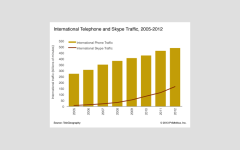I’ve been in the telecommunications industry a long time, and if I had to choose one thing out of all those years as the most important lesson learned, it’s that the industry is continuously evolving (that, and the “customer’s wallet is always right,” but we’ll stick to the evolution thing). We are well into the next stage of that evolution: mobile VoIP.
It’s true that we cover a growing number of mobile VoIP and messaging apps here on TruTower, and we do it because, quite simply, it’s important. These services are where we’re going to be spending an increasingly large amount of our time talking to family and friends.
VoIP app gains will result in heavy losses for carriers through 2020
As we mentioned late last month, VoIP applications are going to cost wireless phone companies all around the world a combined $479 billion USD in losses through 2020 as VoIP usage continues to increase to at least 1 billion customers by 2017. These losses are a result of carriers losing both national and international calling revenues, as well as text messaging revenue, all of which can be used via VoIP and messaging applications at low cost or for free. In fact, many customers have opted to rely more on VoIP and less on their carrier plans and so have lowered these plans or have removed them altogether in favor of unlimited or high-capacity data plans.
 Research confirms that though voice minutes saw a 5 percent increase in 2012 to 490 billion minutes, Skype alone saw its own usage grow 44 percent to a whopping 167 billion minutes. This increase of nearly 51 billion minutes is more than twice that achieved by all international carriers in the world, combined. As call volumes continue to grow, so do the challenges facing the international long-distance industry.
Research confirms that though voice minutes saw a 5 percent increase in 2012 to 490 billion minutes, Skype alone saw its own usage grow 44 percent to a whopping 167 billion minutes. This increase of nearly 51 billion minutes is more than twice that achieved by all international carriers in the world, combined. As call volumes continue to grow, so do the challenges facing the international long-distance industry.
For the VoIP applications themselves, in order to gain users, they must stay one step ahead of the competition and add new features to set themselves apart. Every change, every update, and every feature that a calling or instant messaging application rolls out has the potential to change the entire experience of the application and could give it certain advantages (or, possibly, disadvantages) over its growing competition.
For wireless carriers, though, it’s often not a simple matter of adding features. After all, how many features can you add to a SIM card? Still, a couple of global carriers (which we also cover in large quantity here on TruTower) — Truphone and Maxroam — have done a great deal of work in order to stand out from the competition. Both offer users the ability to add multiple numbers per SIM and Truphone has even gone the extra mile to include a VoIP application with its service to help supplement coverage for customers. The app has the added advantage of giving Truphone the ability to monetize the VoIP experience for its customers while providing that additional coverage.
Carriers need to push the innovation envelope if they want to survive
Which brings us back to the evolution thing. That’s really what carriers need to do: in the face of so much competition, they may need to push innovations such as their own proprietary VoIP applications and new features on their respective SIM cards in order to survive. In many cases, it may be to the carriers’ advantage to work alongside existing VoIP app providers in order to make such innovations happen, agreements similar to those of Nimbuzz with carriers in Singapore and Asia, Skype with carriers in Russia and (soon) Canada and the United States, and LINE with some carriers in Asia.
In order for wireless carriers to survive to the next evolution of wireless, it’s quickly becoming a necessity rather than simply an option for them to work side-by-side with VoIP providers — and not only for the sake of their own survival, but also for the sake of their customers (and, of course, their customers’ wallets).

